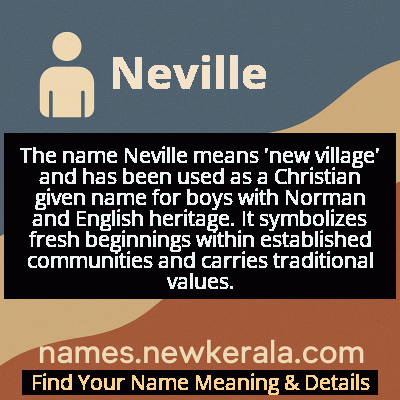Neville Name Meaning & Details
Origin, Popularity, Numerology Analysis & Name Meaning of Neville
Discover the origin, meaning, and cultural significance of the name NEVILLE. Delve into its historical roots and explore the lasting impact it has had on communities and traditions.
Name
Neville
Gender
Male
Origin
Christian
Lucky Number
7
Meaning of the Name - Neville
The name Neville means 'new village' and has been used as a Christian given name for boys with Norman and English heritage. It symbolizes fresh beginnings within established communities and carries traditional values.
Neville - Complete Numerology Analysis
Your Numerology Number
Based on Pythagorean Numerology System
Ruling Planet
Neptune (Ketu)
Positive Nature
Intuitive, analytical, spiritual, and inquisitive.
Negative Traits
Secretive, reserved, aloof, and can be overly critical.
Lucky Colours
Green, yellow.
Lucky Days
Monday.
Lucky Stones
Cat’s eye, moonstone.
Harmony Numbers
1, 5, 6.
Best Suited Professions
Scientists, researchers, spiritual leaders, detectives.
What People Like About You
Depth of knowledge, analytical skills, spirituality.
Famous People Named Neville
Neville Chamberlain
Politician
British Prime Minister known for his policy of appeasement toward Nazi Germany prior to WWII
Neville Marriner
Conductor
Founder of the Academy of St Martin in the Fields and renowned classical music conductor
Neville Brody
Graphic Designer
Influential typographer and art director who revolutionized magazine design and digital typography
Neville Goddard
Author/Mystic
Influential figure in the New Thought movement and author of metaphysical works
Name Variations & International Equivalents
Click on blue names to explore their detailed meanings. Gray names with will be available soon.
Cultural & Historical Significance
Extended Personality Analysis
Individuals named Neville are often perceived as thoughtful, reliable, and somewhat traditional in their approach to life. They tend to be methodical thinkers who value stability and consistency, often displaying a quiet determination that others may underestimate initially. Nevilles are typically known for their loyalty to friends and family, and they often serve as the steady foundation in their social circles. While they may appear reserved at first meeting, those who know them well appreciate their dry wit and deep capacity for caring. Their analytical nature makes them excellent problem-solvers, though they may sometimes be perceived as overly cautious. The name carries connotations of dignity and integrity, with many Nevilles developing a strong sense of personal ethics and responsibility that guides their decisions throughout life. They often excel in roles that require patience, attention to detail, and long-term planning. This combination of traditional values with quiet strength makes Neville a name associated with dependable character and understated competence rather than flashy achievement.
Modern Usage & Popularity
In contemporary times, Neville remains a recognizable but relatively uncommon given name, particularly in English-speaking countries. Its usage saw a significant boost following the popularity of the Harry Potter series, where Neville Longbottom became a beloved character who evolved from clumsy student to heroic figure. The name maintains a classic, slightly old-fashioned quality that appeals to parents seeking traditional names with historical depth. While it has never reached the popularity peaks of names like William or James, it enjoys steady usage among families with British heritage or those appreciating its aristocratic connections. In recent decades, the name has become more international, appearing in former British colonies and among families with no direct British ancestry who simply appreciate its sound and history. Current naming trends show Neville occupying a comfortable niche as a distinguished but accessible choice that avoids being overly common while still being familiar to most people.
Symbolic & Spiritual Meanings
Symbolically, Neville represents new beginnings within established structures - the 'new village' meaning suggests innovation within tradition. It embodies the concept of building upon foundations while introducing fresh perspectives. The name carries connotations of growth, community development, and the balance between honoring the past and embracing the future. Metaphorically, it suggests someone who can bridge generations, respecting heritage while contributing to progress. The village symbolism implies connection to community, stability, and the importance of roots, while the 'new' element represents adaptability and forward-thinking. This combination makes Neville symbolically rich, representing the ideal of measured progress and thoughtful evolution rather than radical change. In Christian symbolism, the concept of building new communities aligns with biblical themes of fellowship and the establishment of faith communities, adding spiritual dimension to the name's inherent meaning.

